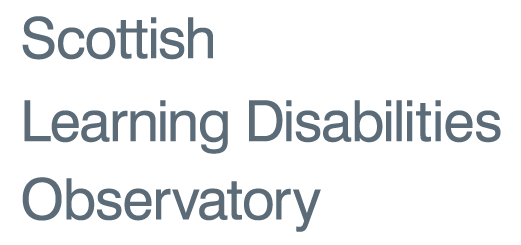News
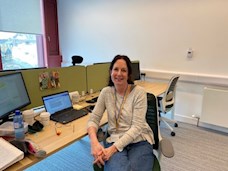
Guest blog from Norwegian researcher Kjersti Wessel Jevne
We had the pleasure of hosting Kjersti, a PhD candidate from the Inland University of Applied Sciences in Norway, earlier this year. Read Kjersti's blog about her experiences of visiting the Scottish Learning Disabilities Observatory and her time in Glasgow.
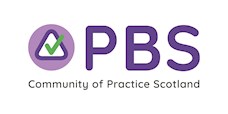
Launch of new eLearning Resource: 'Understanding PBS'
The Positive Behaviour Support (PBS) Community of Practice for Scotland are launching a unique new resource focused on PBS. This free and accessible online learning resource is the result of a collaboration between the Scottish Social Services Council and the PBS Community of Practice (https://www.scld.org.uk/our-networks/positive-behaviour-support-pbs/)
The new resource will be launched with an online event on 19th April being organised by the Scottish Commission for People with Learning Disabilities. There will be a range of speakers to talk about how PBS can improve quality of life for people with learning disabilities and complex support needs. And there will be an opportunity to see the resource and learn how to access it. Further details and registration link for the event are available here.

SLDO to become leading research and teaching centre
We are delighted to announce that the Scottish Learning Disabilities Observatory (SLDO) and the University Centre for Excellence in Developmental Disabilities (UCEDD) are merging. This exciting development will bring together multi-disciplinary researchers to form one of the UK’s largest research centres dedicated to improving the health and wellbeing of people with intellectual and developmental disabilities. Read more about this here.
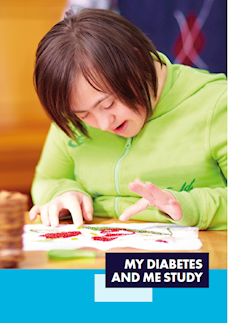
New study: 'My Diabetes and Me' - call for participants
Dr Maria Truesdale and colleagues at the University of Ulster are looking for participants in a new study looking health improvement for adults with learning disabilities and Type 2 diabetes.
The 'My Diabetes and Me' study aims to investigate the clinical and cost-effectiveness of the DESMOND-ID education programme for adults with learning disabilities and type 2 diabetes. The aim of DESMOND-ID is to support adults with learning disabilities and the people who care for them to learn about diabetes and about to stay health and well with Type 2 diabetes. Find out more about the study.
Here is an easy read information sheet about the study and how to get involved. If you are interested or you work with or support someone who would like to take part, please get in touch with Maria via email maria.truesdale@glasgow.ac.uk or call 07933 163 937.
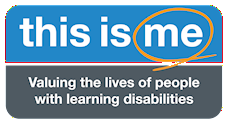
This is Me: Valuing the lives of people with learning disabilities
We are working with the Scottish Commission for People with Learning Disabilities, PAMIS (Promoting a More Inclusive Society) and Down's Syndrome Scotland to raise awareness of the experiences of people with learning disabilities. Through a series of short films, we aim to challenge stigma and discrimination and influence positive change.
Find out more about this exciting new collaborative project.
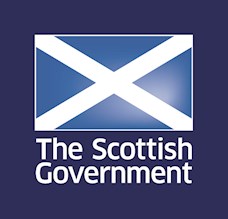
Scottish Government Covid Recovery Consultation
The Scottish Government recently launched a consultation seeking public views on legislative reform to support Scotland's recovery from the Covid-19 pandemic.
The consultation runs from 17th August until 9th November 2021 and seeks to identify which of the temporary legal measures introduced in response to the pandemic should be maintained. These include a number of public health measures that have been considered beneficial to people in Scotland.
Find out more about how you can share your views on these matters at the Scottish Government website.

National Care Service Consultation
On 9th August, the Scottish Government opened the consultation on a National Care Service for Scotland. This consultation is part of what has been described as the ‘biggest public sector reform for decades’.
It is available on the Scottish Government’s consultation hub for people to respond online. It is also available as a PDF via the SG website, where you can also find out about the series of online engagement events running between August and October. Find out more
Easy Read and BSL versions are being prepared, and other accessible versions will be available on request from the Scottish Government team. There is a mailbox for public enquiries –NCSconsultation@gov.scot

SLDO Stakeholder Consultation - tell us what you think!
We would like to understand more about how people are using the evidence generated by the Scottish Learning Disabilities Observatory. We have put together a very short, 5-minute survey to gather this information.
The information you provide will help us to improve our research outputs and activities to ensure our work is relevant, accessible and useful to a wide range of stakeholders.
Thanks for taking the time to complete the survey which you can find here.

New study looks at the impact of COVID-19 on family carers
A new collaborative study will explore the experiences of family carers of people with profound and multiple learning disabilities during the COVID-19 pandemic and co-design an intervention to support their future wellbeing. The research team involves partners at Queen's University Belfast, Trinity College Dublin, the University of South Wales with Dr Maria Truesdale from the Scottish Learning Disabilities Observatory being the Scottish lead.
Find out more about this study.

SLDO statement on COVID-19 vaccination priority for people with learning disabilities
We wholeheartedly welcome the decision by the Scottish Government, announced on 22nd February 2021, to invite all people with learning/intellectual disabilities in Scotland for COVID-19 vaccination as part of priority group 6. We also welcome today’s decision by the UK Government to prioritise all people with learning/intellectual disabilities in England for vaccination. These decisions will bring relief to people with learning/intellectual disabilities and their families.
The Observatory team’s analysis of data on COVID-19 mortality and infection risk for the population with learning/intellectual disabilities in Scotland provided robust evidence to support these decisions. Our recent study shows that compared to the general population, people with learning/intellectual disabilities are at 3 times greater risk of death due to COVID-19, twice as likely to become infected with COVID-19 and twice as likely to have a severe COVID-19 infection. People with learning/intellectual disabilities already experience significantly worse health outcomes and excess mortality compared to the general population. These inequalities are reflected in this important study.
We are encouraged that the vaccine prioritisation has been amended to include this marginalized population and we will continue to work closely with the Scottish Government and health and care professionals to identify ways to further reduce risk of COVID-19 infection for people with learning/intellectual disabilities.
We stand alongside our colleagues at partner organisations who have worked tirelessly to influence the decision making around vaccine prioritisation and we recognise their invaluable contribution to ensuring that people with learning/intellectual disabilities receive urgently needed care and protection. We would also like to thank Joan McAlpine MSP, Jackie Baillie MSP and Claire Haughey MSP, Minister for Mental Health, for their work in advocating for the needs and rights of people with learning/intellectual disabilities in Scotland.
Published on 24.2.21

SLDO researchers lead pioneering new study into suicide risk and incidence in people with autism
The team, led by Dr Ewelina Rydzewska, will be the first in the world to investigate suicide risk and incidence in a whole country population of people with autism.
Dr Rydzewska and Professor Craig Melville from the SLDO will collaborate with colleagues from IHW, the Universities of Edinburgh and Nottingham, Autistica and the Edinburgh and Lothian Asperger Society on this project, which has been funded by the Chief Scientist Office (CSO).
In this world-leading study, the team will make use of using Scotland’s internationally unique administrative and health data linkage environment to investigate suicide attempts and deaths in people with autism and explore the extent to which co-occurring mental health conditions (e.g. anxiety, depression, substance use disorders), contact with healthcare services and socioeconomic factors mitigate or compound the risk of suicide in this population.
More information will be available as this research gets underway. In the meantime, if you would like to discuss this work with our team, please get in touch via sldo-team@glasgow.ac.uk

New study exploring the mental health of father carers
A newly funded study, led by Dr Kirsty Dunn, will investigate the mental health and wellbeing of fathers of a son or daughter with learning disabilities. Until now, research on the mental health of parents with a son or daughter with learning disabilities has largely focused on mothers, with little evidence about fathers' experiences.
This new project, funded by the Baily Thomas Charitable Fund, will begin to address this gap by investigating the mental health of father carers of people with learning disabilities in a large data set and identifying factors associated with their mental health.
We will share more information about this as the study gets underway. In the meantime if you have any questions about this or any of our research, please get in touch via sldo-info@glasgow.ac.uk

New SLDO study looks at COVID-19 and mortality rates for people with learning disabilities in Scotland
The Scottish Learning Disabilities Observatory, Scottish Government and National Records of Scotland are leading a new collaborative study into rates of COVID-19 infection and mortality rates for people with learning disabilities in Scotland.
At present, there is a major gap in the data available in Scotland on rates of infection, case fatality and excess mortality rates due to COVID-19 among this population. This information is urgently required to inform clinical decision-making and public health policy in Scotland and the UK.
People with intellectual disabilities experience significant health and social inequalities that increase their risk of infection with COVID-19 and serious complications due to infection. This population, including children and young people with intellectual disabilities, are at significantly greater risk of respiratory-related mortality than other people. The main presentation of COVID-19 is respiratory and therefore it is critical that its impact on this population who are at increased risk of death from respiratory causes is investigated.
We will be sharing more information as this work develops. Please get in touch if you would like to know more, email us at sldo-info@glasgow.ac.uk
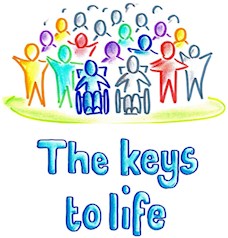
Keys to Life
The new implementation plan for the Keys to Life has been launched on 13th March 2019 by COSLA and Scottish Government.

Health Needs Assessment updated
An updated health needs assessment has been published today by NHS Health Scotland. The report updates the existing 2004 needs assessment and takes into account the growing research evidence base regarding the health of people with learning disabilities. It covers the health inequalities they may experience and the barriers to accessing health services appropriate to their needs.
